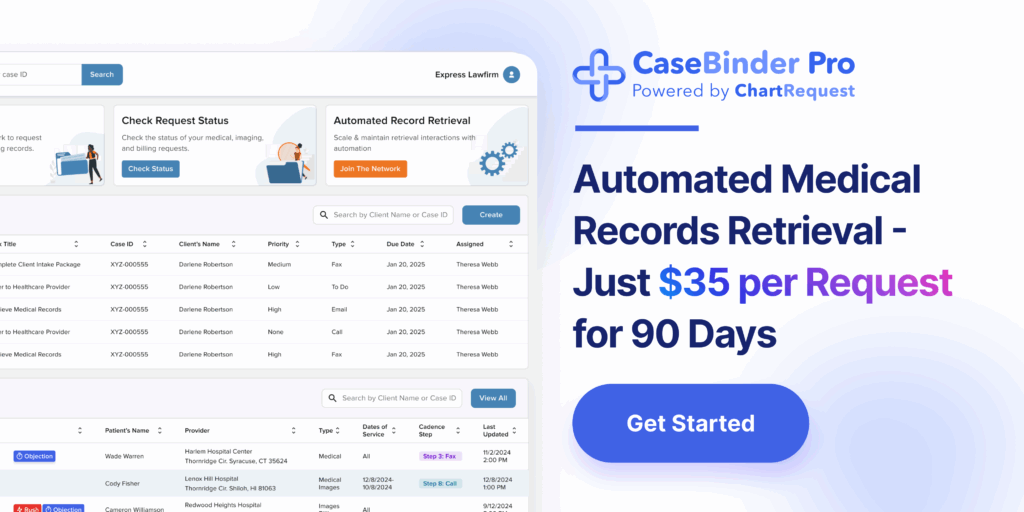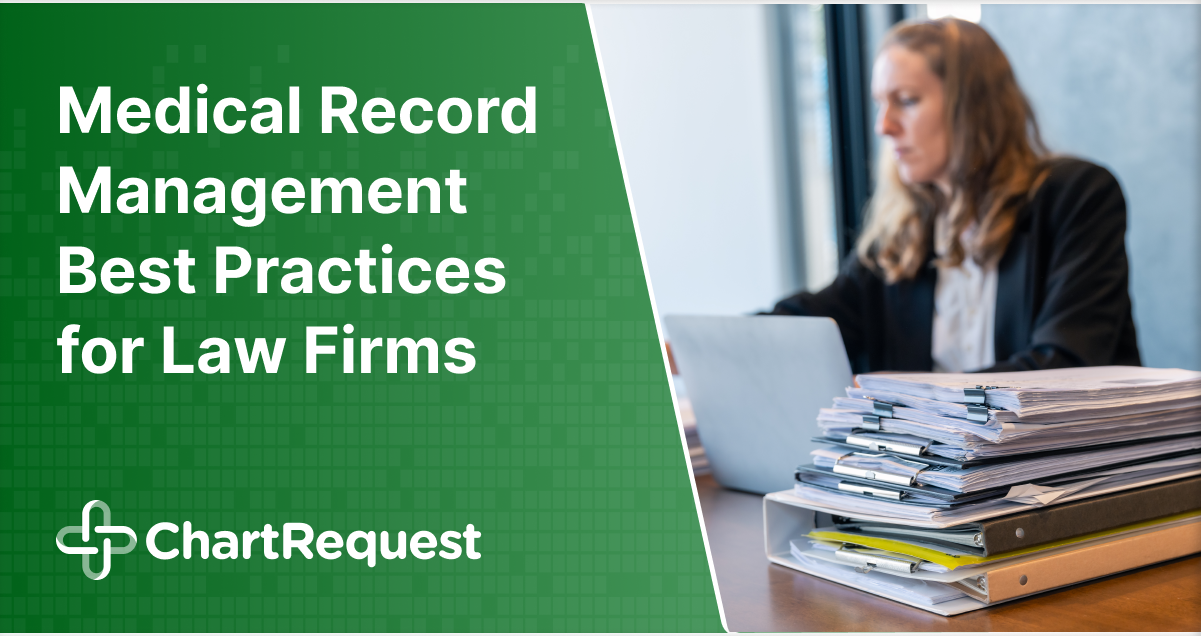Medical records management best practices can reduce administrative burdens on your legal team. We know how it is — you’re sifting through an avalanche of medical records while preparing a case. You might juggle paper files stuffed into folders or data lost in a sea of scattered PDFs.
The workload can be overwhelming.
The good news is that you can do something about it. Following medical records management recommendations can eliminate headaches during your day to day. This article will outline proven solutions to reduce client record retrieval without paying a fortune.
Schedule a consultation with ChartRequest to explore record retrieval automation with CaseBinder partnership.
Common Problems During Record Management
Medical records are a goldmine of client information, whether you handle personal injury cases or medical malpractice claims.
Balancing record management strategies can be challenging due to:
- Missing Records: When records go missing, it can impact your client’s leverage over settlements and trials.
- Disjointed Data: You may need to piece information together from various records. This responsibility can be time-consuming and frustrating when data silos create obstacles during retrieval.
- Limited Resources: Navigating records requests can drain resources. Paper and ink aren’t the only office supplies involved. You must also consider the billed hours for paralegals when calling providers and digging through files.
- Costly Confusion: Every minute spent wrestling with messy records is a minute not spent helping clients. These delays can raise costs to the firm and the client.
Impact on Clients
Mismanaged record retrieval can drain your team and hurt your firm’s reputation.
Imagine you are a client waiting for answers or updates to a civil suit, only to learn that paperwork problems are delaying your case. Unorganized records can lead to unhappy clients, which prevents business growth.
According to a Harvard study, increasing your Google rating can help boost client intake by 5% to 9%.
Even if you have the records on hand, misuse could result in less compensation for your client during settlement negotiations.
The Big Picture
Unorganized medical records are not just a nuisance but also a serious setback. They make cases harder to manage, increase overhead costs, and even affect outcomes.
For paralegals, it can be a daily challenge impacting their workload and mental health. Recurrent delays can lead to burnout, reduced efficiency, and employee turnover.
For a law firm, efficiency is key. But when disjointed records slow down everything. Slow turnarounds mean less time for new clients.
Law Firm Bottlenecks: Paralegal Burdens
It takes time to deal with client medical records for several reasons. Some of these tedious tasks include:
- Acquiring Needed Records: Sometimes, locating client records from physical or digital storage can feel like a wild goose chase. Hospitals and clinics have their own Release of Information processes that are not always accessible to paralegals.
- Finding Specific Data: Even when you locate client files, identifying the exact info you need from them can be a hassle. It can be like looking for a needle in a haystack.
- Maintaining Confidentiality: HIPAA regulates patient rights and privacy protections. Law firms must handle records within set parameters to maintain compliance.
Using medical records isn’t a walk in the park for paralegals. However, medical records management best practices can support an intuitive workflow.
Top 4 Medical Records Management Best Practices for Law Firms
Here are the top four best practices to make your record retrieval process stress-free:
1. Utilizing Digital Medical Records
Faxing can grind your record requests to a halt. Manual page scans can take hours and result in hard-to-read text. Even if your firm uses electronic fax, you may fall victim to lost image quality, failed sends, and other frustrating issues.
Integrating a record retrieval platform — like ChartRequest — can eliminate some of these concerns. Digital storage improves data clarity while protecting them from floods, fires, or other natural disasters.
Digital record management tools also enable you to transfer client data in just a few clicks, with greater accessibility than traditional paper methods.
2. Centralizing Records Management
Centralizing medical records management into a single platform can boost your firm’s case management efficiency.
With this option, you can reduce the time spent searching through disparate systems or physical files. Additionally, centralizing your records management improves communications with custodians and ensures paralegals access to the same file location.
Law firms sometimes undergo internal and external compliance audits. Centralized records management ensures these examinations are quick and non-invasive to paralegal operations.
3. Privacy and Security
Keeping client information secure is non-negotiable in this line of work. Law firms are responsible for safeguarding Protected Health Information (PHI).
Beyond strong password policies and controlled access, implementing robust security measures is just as important. Consider that 65% of law firms reported a cyberattack or data breach in 2022. This alarming statistic underscores the importance of investing in top-tier security systems to protect sensitive client information.
Implementing systems with encryption, intrusion detection, and firewalls are great places to start. For example, ChartRequest has military-grade security features to protect your clients’ privacy during transfers and use.
4. Regular Audits
Medical record management audits provide insight into how your company fares against compliance standards and where improvements are necessary.
Routine audits can identify unauthorized access attempts, providing an early warning sign for potential data breaches or even insider threats in some cases. These reviews can also highlight internal processes that may be worth improving.
6 Ways ChartRequest Supports Medical Records Management Best Practices
ChartRequest is the leading platform for paralegals who manage client records. Our all-in-one platform aligns with medical records management best practices by enabling:
1: Seamless Record Retrieval
Forget about faxing or mailing requests. With ChartRequest, it’s all about simplicity and speed. We use fully automated digital workflows to take the weight of record retrieval off your shoulders.
2: Effortless Organization
We offer one convenient location for all client record needs. It’s like having a digital filing cabinet that doesn’t take up office space.
Our indexing features enable you to find the exact record you need as quickly as a Google search.
3: Enhanced Security and Compliance
ChartRequest takes privacy seriously, ensuring every step of your process is HIPAA-compliant. It’s like having a digital bodyguard for your clients.
From request to delivery, you can enjoy encryptions on every bit of data. Our process is as secure as online banking.
4: Unmatched Accessibility
Access retrieved records anytime, anywhere.
Whether you’re on a laptop at the office or checking your tablet in court, ChartRequest covers your team with simple gateways for authorized users.
5: Streamlined Communication
Don’t worry if you need to follow up on a record request. ChartRequest’s in-channel communication lets you chat directly within the platform.
Get real-time updates on the status of your requests. Our alert features also keep you updated on the location and retrieval progress of your data.
6: Round-the-Clock Support
You might be working late at the office some nights. With ChartRequest, you won’t need to wait until office hours to tackle medical record management. This service offers 24/7 tech support for paralegals.
ChartRequest also walks users through any technical questions they may have about using the platform. Onboarding is quick and won’t take time out of your productivity.

Say Goodbye to Record Management Frustration With ChartRequest
Are you experiencing delays and inefficiencies in your record management strategy?
ChartRequest is ready to resolve the problem on your behalf! Our CaseBinder solution allows you to focus on other administrative tasks while you leave record requests to us.
Above all, we will prioritize your legal compliance with modern security and HIPAA-recommended encryptions.
Learn more about how medical records management best practices can boost your efficiency. Partner with ChartRequest today!


